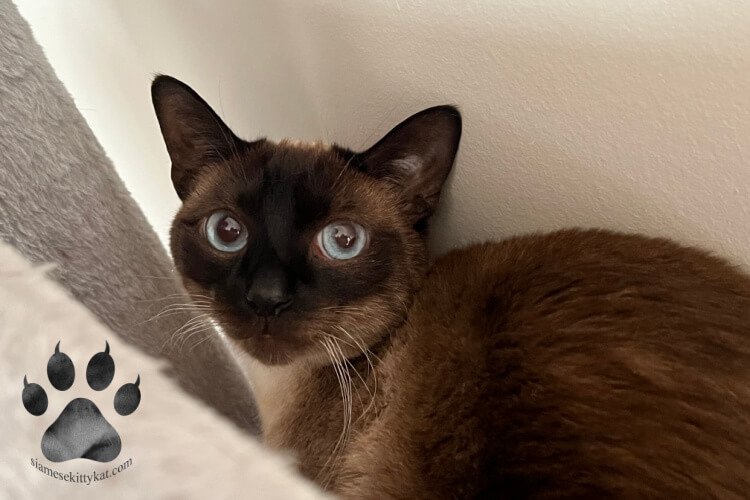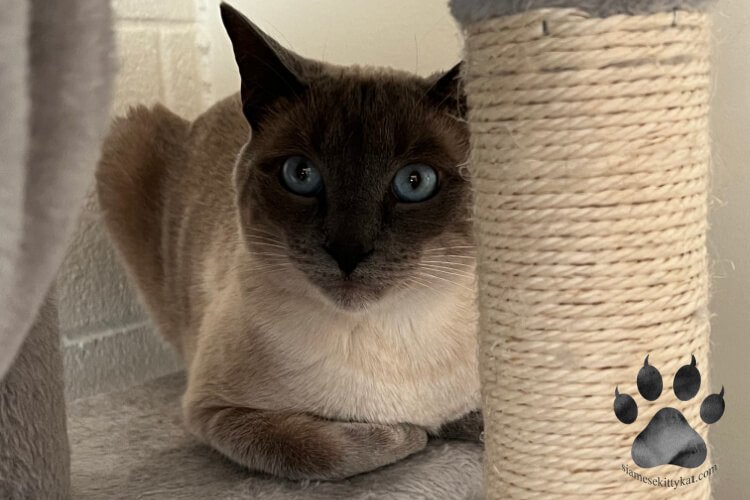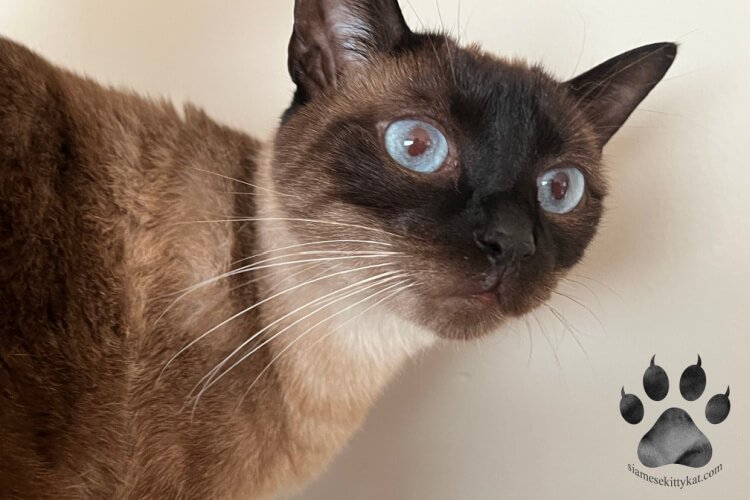Siamese cats are one of the oldest breeds of domestic cats. They have a good reputation for being long-lived. Siamese cats have a life expectancy ranging from 12 to 20 years for females and 15 to 20 years for males.
There is no doubt that Siamese cats live longer. But, they can also be prone to specific genetic disorders like any other breeds.
What is the oldest Siamese cat?
Scooter, born on March 26, 1986, is a 30-year-old Siamese cat from Mansfield, Texas. The Guinness Book of World Records announced Scooter as the oldest living cat in 2016. His owner, Gail Floyd, described him as an active, full of energy, and playful cat. Floyd claimed that keeping him active is the key to Scooter’s longevity.
Do Siamese cats live longer than other breeds?
Siamese cats are a desirable breed. But, people often ask if Siamese cats live longer than other breeds. It is hard to give an answer to this question since there are many factors that contribute to a cat’s lifespan. It’s true to say that each individual cat is unique and has its own life expectancy.
To give you an example, some Siamese cats have already lived shorter lives than the average. There are also some that have managed to live longer than 15 years. Yet, there is no certainty that they will live longer than their feline counterparts. If you want a feline companion who will become a member of your family, you can pick the one that best suits your needs.
Outdoor cat vs. Indoor cat lifespan
The average lifespan of an outdoor cat is two to five years, while an indoor cat lives 10 to 15 years.
Fear of road traffic accidents, thefts, attacks by humans or animals, and bad weather are all factors that influence the decision to keep cats indoors.
In a recent study about feline mortality rate, 11% of deaths were caused by road accidents. The rest of the causes are disease-related. Interestingly, these diseases are prevalent in outdoor cats.
Road-traffic accidents concern every car owner. According to a survey conducted in the UK, 63% of cat owners keep their cats indoors. They believe that it will prevent them from getting involved in traffic accidents. It will also keep them from the trauma associated with accidents.
Cats hit by cars can suffer serious injuries such as fractured bones or brain damage. They may need expensive veterinary treatment to recover. If your cat gets hit by a car, take them to the vet as soon as possible. When in veterinary care, many of them will recover from injuries.
Despite the dangers of the outside world, can Siamese cats live outside? I weighed the advantages and dangers of letting our beloved furry friends outdoors in one of my blogs. Check it out by clicking on the link.
I can’t limit my cats’ freedom because they need to explore the outside as well. I do a few things to allow Batman and Robyn to play outside instead of remaining indoors all day. These things enable them to enjoy a long and healthy life free of accidents and injuries:
Our lovely Siamese cat named Cleo lived a long life. He lived to be 14 years old. I kept him inside our house for over 10 years. Then my husband decided he wanted Cleo to be able to go in and out of the house.
Cleo would have lived even longer than 14 years if he were an inside cat.
It is critical to know which part of a cat’s habitat can give a positive experience. To meet basic needs, cat welfare organizations advocate providing food and water bowls, litter trays, and scratching posts. Hiding spots, vertical vantage points, and toys that stimulate hunting suggest further enrichment.
This Gigwi Mouse Cat Toy is one of the reasons why my cats still have adequate play time despite not being let outside often. Check it out on Amazon by clicking on the link.
An appropriate environment enhances the quality of life of cats. It also provides benefits in terms of companionship and decreases the chance of animal relinquishment.
How long do indoor Siamese cats live?
Siamese cats that are kept indoors live for 12-20 years on average. This is far longer than an outdoor cat’s average life span of 2-5 years.
This is because indoor cats are not exposed to many of the dangers that outdoor cats face. These include car accidents, predators, and toxic chemicals.
Siamese cats’ lifespans may vary based on many factors such as nutrition, exercise, and heredity.
The Siamese breed is prone to respiratory problems and kidney disease. Both of these can shorten their lifespan.
You can help your Siamese cat live a long and healthy life by taking good care of them and having regular vet check-ups.
How long do female Siamese cats live?

Female Siamese cats live for an average of 12 to 15 years, although some live until their early 20s. They live slightly longer than male Siamese cats.
The male Siamese cats, on the other hand, can live up to 10 to 12 years. Female cats are less energetic and rarely engage in dangerous activities than males. For example, they are less likely to fight with other cats or stray outside.
Female cats also have easier access to a better diet and healthcare. These can help them live longer, healthier lives.
Aside from their genders and lifespans, male and female Siamese cats have a lot of other surprising differences. If you’re as curious as a cat, read more about it in one of my recent blogs!
The lifespan of a Siamese cat depends on a multitude of factors. This is why it is impossible to predict how long a particular cat will live.
People have different preferences when it comes to choosing the best breed. Some look for ideals such as high intelligence, easygoing, and playful, among others. If you’re looking for a feline companion to share decades with, consider one of these breeds.
What is the oldest cat ever?
Creme Puff died at the age of 38 years and 3 days. She is the oldest cat ever recorded, according to the 2010 edition of Guinness World Record. She was born on August 3, 1967 and lived until August 6, 2005. Creme Puff lived in Austin, Texas, with her owner, Jake Perry. He claimed that proper diet and activity were the keys to her long life.
Grandpa Rex Allen, the previous holder, died on April 1, 1998, at the age of 34 years and 59 days. Jake Perry was also the owner of Grandpa Rex Allen.
Shortest living cat breeds
While most cats live for about 15 years or more, some breeds live for less. The following are the 8 short-lived cat breeds, along with their average lifespans.
1. Abyssinian
Abyssinians are medium-sized cats with a distinctive ticked coat. They are intelligent, inquisitive, and adaptable to any environment. They are engaging and playful around their owners. Abyssinians have a life expectancy of 9-14 years. But, they are prone to a multitude of genetic diseases that could reduce this to 6 or 7 years.
2. Bengal
These water-loving felines have a spotted coat and a muscular build. They are also active and highly intelligent. They demand a lot of attention from their owners. On average, Bengals have a lifespan of 10-14 years. To protect them from diseases, owners keep their Bengal cats indoors. This will also protect them from other outdoor dangers and theft.
3. Burmilla
These cats have bright green eyes and soft fur. They are also affectionate and gentle cats. They love being around people but do not demand a lot of attention. These breeds only require minimal care from their owners and are not considered needy. The life expectancy of this breed is 7 to 12 years. Some of the common health problems that they encounter are diabetes, allergies, and kidney disease.
4. California Spangled
These breeds have a wild appearance that resembles that of a leopard. Despite their wild look, they are not predatory. In fact, they are playful and enjoy spending time with their owners. These cats have a life expectancy of 10-12 years.
5. American Wirehair
These cats have a wiry and rough coat. They are affectionate and sometimes described as having a laid-back personality. They are not vocal about their needs. Thus, you have to be attentive to their body language. These cats have a lifespan of around 7 to 12 years. Some of their health risks include hypertrophic cardiomyopathy and hip dysplasia.
6. Manx
These cats have a tailless body and round appearance. They are sweet and loving companions. They are adaptable to their environment and like to meet new people. They usually exist for about 8 to 14 years. Manx are shorter, and this sometimes results in weak hind legs and spinal cord failure.
7. Cymric
Like Manx, these breeds are tail-free. They have longer coats than the Manx. Cymrics live around 8 to 14 years. Their overall nutrition must be controlled to keep them in good shape.
8. Khao Manee
The Khao Manee is a pure white cat. Their eyes are distinctive for their color, which can be blue, gold, or one of each color. These cats love consistent human interaction, especially with children. Since they are affectionate, it is important to never leave these cats alone as they tend to feel lonely. The life expectancy of this ancient breed is around 10 to 12 years. These cats are prone to deafness.
These cats can bring friendship and affection despite their short life expectancy. But, If you want a long-lived companion, you should opt for a different breed.
Do Siamese cats have health problems?

Siamese cats have a reputation for being high-maintenance. Because of this, many people question if they are prone to health problems. Siamese cats are generally healthy animals. However, their wedge-shaped head makes them more susceptible to dental and respiratory conditions. Regular vet check-ups, combined with good oral hygiene, will keep these problems at bay!
Diseases Associated with the Siamese Breed
1. Amyloidosis – Amyloidosis is a condition in which abnormal proteins accumulate in the body’s organs and tissues. In Siamese cats, the liver is the preferential site for amyloid accumulation rather than the kidney. They can be susceptible to Amyloidosis because of a genetic mutation that inhibits their capacity to mobilize these proteins.
Treatment for Amyloidosis is usually costly and does not always work. But, early detection and treatment can increase the odds of a Siamese cat enjoying a long and healthy life. Owners should get their cats examined by a veterinarian on a regular basis. This will ensure that their health is being monitored. Siamese owners should also ensure that their pets are well cared for.
2. Cancer – Cancer is a condition in which cells multiply and create tumors. Siamese cats are more likely to develop lymphosarcoma. It is cancer that can damage the lymph nodes, spleen, and other organs.
Siamese cats with cancer may experience common symptoms. These include a loss of appetite, weight loss, lethargy, and unhealed wounds. If your Siamese cat exhibits any of these symptoms, you should take them to the vet right away for a check-up. When it comes to cancer treatment, early detection is critical. Siamese cats who are diagnosed early have a better chance of survival.
3. Asthma – Siamese cats are more likely to develop asthma. This is a lung disease that makes breathing difficult. Siamese cats who live in dusty or smoky environments are especially vulnerable to the disease.
Wheezing, coughing, and difficulty breathing are all signs of Siamese asthma. If left untreated, Siamese asthma can lead to major health problems, including lung damage and even death. Siamese asthma can be controlled with medication, but if your cat exhibits respiratory symptoms, you should seek veterinarian help.
4. Psychogenic Alopecia – is a compulsive disorder in which a cat grooms itself excessively, resulting in hair loss. Chronic stress or psychological trauma can both contribute to this disease. Changes in their surroundings can trigger them to start pulling out their fur. For example, when there is a new person in the house or a move to a different home.
Antidepressants and stress management may treat this condition. To keep them busy and ease boredom, owners can offer them plenty of toys and playtime. They can also create a calm atmosphere by eliminating loud noises and keeping the place clean.
5. Feline Hyperesthesia Syndrome – Feline hyperesthesia syndrome, another stress-related illness, is also common in Siamese cats. Feline hyperesthesia syndrome causes oversensitivity of the skin. This can lead to unusual and aggressive behaviors. Siamese cats with FHS should see a veterinarian for diagnosis and treatment options.
6. Cardiomyopathy or heart disease – Cardiomyopathy is a disease of the heart muscle that can result in congestive heart failure. It can cause the heart to expand and become unable to adequately pump blood. The condition can be inherited or brought on by a viral infection. It is present in the Siamese breed though not very common.
7. Eye Problems – Eye problems such as crossed eyes, glaucoma, and progressive retinal atrophy are also reported with this breed. These conditions can cause decreased vision and blindness. Siamese cat owners must be very vigilant about monitoring their pet’s vision. They must get immediate veterinarian assistance if any problems arise.
8. Vestibular disease – Siamese cats are prone to vestibular disease, a hereditary condition that affects the nerves of the ear. It can cause loss of balance, head tilting, disorientation, dizziness, nausea, and eye drifting. Most cases of vestibular disease resolve on their own after a few weeks.
Siamese cats have significant health issues. But, they can still be loving and faithful friends. Siamese cats can have a long and healthy life with proper care and regular vet visits.
How to extend the life of a Siamese cat

There are a few things that owners may do to help their Siamese cats live longer. Here are some of the best examples:
1. Feeding her a Healthy Diet – One way to help extend the life of your Siamese cat is to feed them a high-quality diet. It should be appropriate for their age and activity level.
Siamese cats are prone to weight gain, so it’s important to avoid foods that are high in fat and calories. A diet rich in protein and vitamins will help keep them healthy and strong. Always consult your veterinarian to determine the appropriate food for your cat.
Remember:
2. Keep Her Inside – The external environment influences the risk of infectious diseases in animals. This is why pet owners limit outdoor access to minimize the risks such as vehicle accidents, injuries, and exposure to infectious diseases.
3. Bring Your Cat To The Veterinarian Regularly – As a pet owner, ensure that vaccinations of your Siamese cats are up-to-date. Provide your Siamese cat with regular vet check-ups and preventive care. These might include vaccinations and routine deworming.
4. Activity or Exercise – Another way to help extend the life of your Siamese cat is to provide them with plenty of exercise. This will help them maintain their muscular strength and flexibility. Siamese cats are very active and playful. So, it’s important to give them toys and scratching posts to keep them entertained. You should also consider walking them with a harness and leash.
Not sure which toys your feline buddies might like? This UPSKY Interactive Cat Toy Roller is one of Batman and Robyn’s favorites. Click the link if you think your Siamese cats might want to give this a try too!
5. Love and Care from Human Caretakers – Don’t leave your Siamese alone for too long. Provide them with a safe and stress-free environment where they can feel comfortable and loved.
6. Take Care of Their Oral Health – Siamese cats are also known to be prone to dental problems. Thus, regular teeth cleanings by a vet or professional groomer are essential. Or, you can also learn to brush your Siamese cat’s teeth. In fact, it’s actually not that hard! Follow our detailed guide here: https://siamesekittykat.com/how-to-brush-your-siamese-cats-teeth-5-easy-steps/
Do not dismiss the little signs and symptoms experienced by your Siamese cats. By following these simple tips, you may help your Siamese cat live longer and spend many happy years together.
What is the average lifespan of Siamese cats? The answer is usually 15 years. But, with adequate care and nourishment, they can survive for 20 years or longer. If you have any concerns regarding your cat’s health, always see your veterinarian. Thank you for taking the time to read this!
Be the Siamese Cat expert you always wish to be! From color points to similar cat breeds, discover everything you need to know about their unique charm and characteristics in our comprehensive guide: Siamese Cat Breed: Types, Color Points and Comparison to Other Cat Breeds
Want to immerse yourself more in the captivating world of Siamese cats? I’ve got all the information you need from their distinct color points to their fun personalities: Siamese Cats: Unique Features and Personality
Get your FREE Siamese Cat 2025 Printable Calendar

